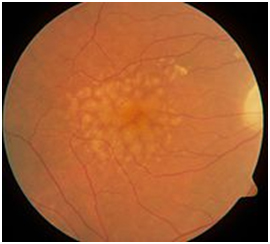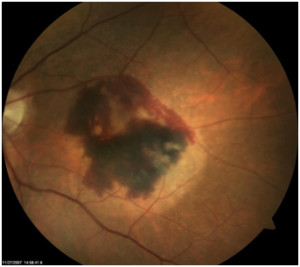On occasion, there are landmark studies regarding the eyes that everyone should know about. Today on Eye to the Future we will be discussing two such studies, by far the largest and most important studies on preventing the progression of the aging condition Macular Degeneration. (For those not interested in the science, the results and take home points are summarized at the bottom of this post.)
 Age Related Macular Degeneration (ARMD or simply AMD) is the leading cause of new blindness in the United States for individuals over 65 years old. This condition is not a new problem, however, for many decades the mechanism for why this damage occurred was unknown and treatment options for this condition were woefully limited and relatively ineffective. Thankfully, in the last decade and a half, some genius innovations in treatment, as well as some landmark studies on prevention, have given individuals afflicted with this blinding disease a fighting chance at retaining vision throughout their lives.
Age Related Macular Degeneration (ARMD or simply AMD) is the leading cause of new blindness in the United States for individuals over 65 years old. This condition is not a new problem, however, for many decades the mechanism for why this damage occurred was unknown and treatment options for this condition were woefully limited and relatively ineffective. Thankfully, in the last decade and a half, some genius innovations in treatment, as well as some landmark studies on prevention, have given individuals afflicted with this blinding disease a fighting chance at retaining vision throughout their lives.
 Macular Degeneration can be classified into two categories Dry and Wet (for an in-depth discussion on the difference between the two, please view our website for a thorough discussion). Dry Macular Degeneration (above) always comes first and by itself can cause vision loss, however, more often it is the 10-15% of patients that convert to the Wet form (with its associated bleeding and scarring) that suffer severe permanent damage. Therefore, researchers set out to look for ways at preventing or at least slowing down the conversion to this more aggressively blinding Wet form (right). The research culminated in the Age Related Eye Disease Study (AREDS) that was first published in October of 2001, and overnight, changed the way eye care practitioners approached macular degeneration.
Macular Degeneration can be classified into two categories Dry and Wet (for an in-depth discussion on the difference between the two, please view our website for a thorough discussion). Dry Macular Degeneration (above) always comes first and by itself can cause vision loss, however, more often it is the 10-15% of patients that convert to the Wet form (with its associated bleeding and scarring) that suffer severe permanent damage. Therefore, researchers set out to look for ways at preventing or at least slowing down the conversion to this more aggressively blinding Wet form (right). The research culminated in the Age Related Eye Disease Study (AREDS) that was first published in October of 2001, and overnight, changed the way eye care practitioners approached macular degeneration.
AREDS
It had been hinted at in smaller previous studies that antioxidants as well as the trace element Zinc appeared to be helpful for macular degeneration patients. As a direct result, many patients starting taking high doses of these vitamins and minerals without any set dosing amounts, schedules, or any singular study that ensured this practice was even effective… or safe for that matter!! It became clear that a definitive study was needed and the National Eye Institute, one of the government’s Institutes of Health, brought onboard a decorated panel of eye doctors, biochemists, and nutritionists who came together and concocted the follow mixture of supplements.
Vitamins
o Beta-Carotene (15mg) which is converted in the body to Vitamin A
o Vitamin C (500 mg)
o Vitamin E (400 IU)
Trace Minerals
o Zinc (80 mg), which was shown to be effective in earlier studies
o Copper (2 mg) to prevent anemia while taking high doses of Zinc.
Over 3500 patients with various amounts of Macular Degeneration took this supplement for a minimum of 5 years. Once all the data was tabulated, the most encouraging results were for the patients who needed it most with intermediate to advanced Macular Degeneration. The results for patients in this category are outlined below.
Vitamins Alone
|
Trace Minerals Alone
|
Vitamins AND Trace Minerals
|
Once it was shown that this nutritional supplement formula of both vitamins and trace minerals decreased advanced Macular Degeneration by 25% and vision loss by nearly 20%, many different nutraceutical companies began reproducing the AREDS Formula with brand names that you have likely heard of or have seen in stores like I-Caps™, PreserVision™, Ocuvite™, et al.
AREDS 2
Not long after the AREDS was published, the researchers behind the AREDS study went back to work on an even larger more detailed study using the information gleaned from the first study. The results of the AREDS 2 were just released in 2013. This improved study adjusted two of the past components of the AREDS formula and also added a third.
- Beta-Carotene: Very high doses of Beta-Carotene/Vitamin A supplements have been linked to an increased risk of Lung Cancer in current or former smokers. Since smoking in-and-of-itself is already a significant risk factor for developing Macular Degeneration, beta-carotene was removed completely for safety reasons and replaced with two other carotenoids: Lutein (10 mg) and Zeaxanthin (2 mg) which were deemed a safer and equally effective substitute for Vitamin A.
- Zinc: It was suspected that high dosages of Zinc are linked to digestive problems. Reducing Zinc (to 25mg) showed the same benefit as the AREDS formula, but removing Zinc from the formula completely was detrimental.
- Omega 3 fatty acids (fish oils): These compounds are a known anti-inflammatory and antioxidant. Researchers added this compound to the AREDS formula in hopes of additional reduction in risk, however, Omega 3’s were shown to have no effect on Macular Degeneration progression.
AREDS 1 and AREDS 2: Take Home Points
- Any patient with confirmed macular degeneration will benefit from eye specific supplements, but these supplements are most helpful for patients with moderate to advanced Macular Degeneration.
- These supplements should be taken IN ADDITION to any multivitamins, not as a substitute (9 out 10 patients in the AREDS 2 study were also taking a concurrent multivitamin). If only one supplement is desired, there are formulations of these supplements that combine the AREDS formula with a multivitamin for simplification.
- The original AREDS formula is fine for many, if not most patients.
- Any smoker or former smoker should avoid beta-carotene supplements completely and use only the AREDS 2 formula with Lutein and Zeaxanthin instead.
- Omega 3 fatty acids (fish oils) although wonderful for the body and the eyes, did not have a meaningful impact on Macular Degeneration.
- These studies ONLY found benefit for patients with diagnosed Macular Degeneration. These supplements are not designed, and should not be taken for “routine” eye health or even for patients with a family history of Macular Degeneration.
We hope you found this discussion interesting. As always, if you have any questions or have ideas for future topics feel free to contact us and ask. We love questions!
Eye to the Future next week will be a fun one… but I’ll let it be a surprise.


